by cidaut | Jul 15, 2021 | MOBILITY
Probono Project has been approved for funding by the European Commission in the Frame of Green Deal. Probono brings together 47 partners all around Europe to develop innovative energy efficient buildings in connected suitable green neighbourghoods.
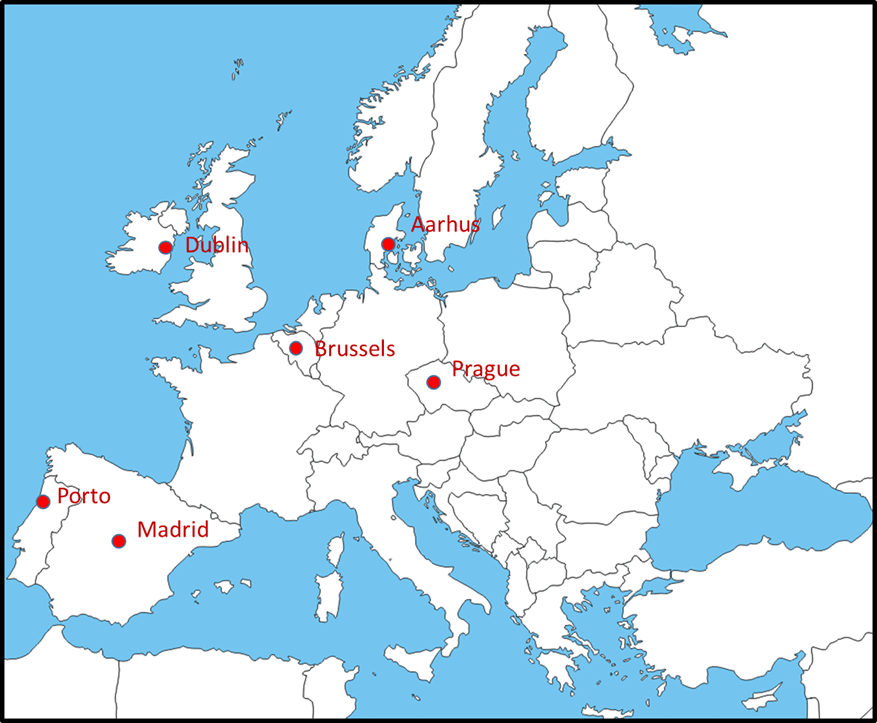
To demonstrate the results achieved through the project two large scale demonstrators, Madrid and Dublin, and four living labs, Brussels, Porto, Aarhus and Prague, have been proposed across Europe. Cidaut will contribute with mobility, connectivity and integration of renewable energies in Dublin and Madrid.
The large scale demonstrators will focus on new buildings, retrofitting and green districts development, energy optimization at district level, integration in the grid and electromobilty. The project will provide support at city level and will interact with citizens looking for solutions to be reproduced in follower cities.
The living labs will focus on smaller scale business driven renovation or construction projects with clear definition of value proposition and also looking for solutions to be integrated in follower cities.
The project will start on Autumn and will last for 60 months.
by cidaut | Jul 15, 2021 | Materials, MOBILITY
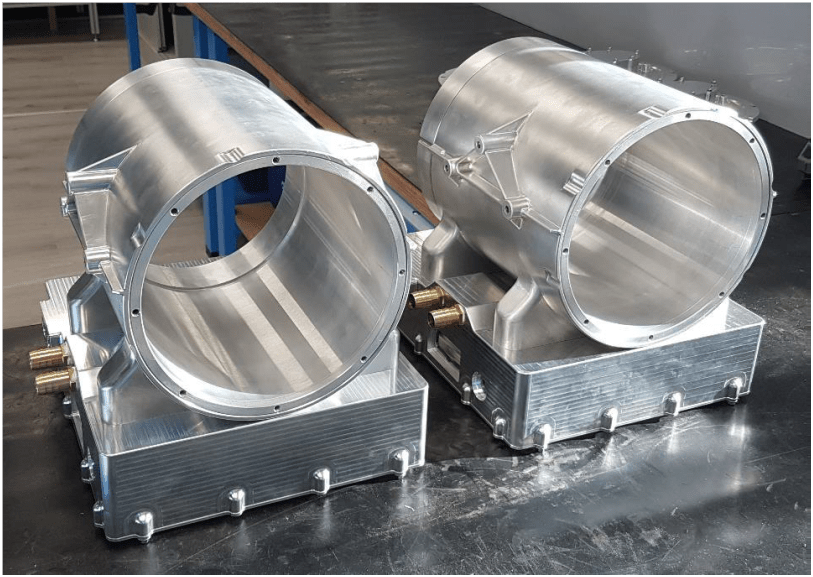
The finalization of RefreeDrive Project, led by Cidaut, has confirmed that it is possible to manufacture electric motors not only free of rare earths but also avoiding the use of critical materials coming from outside the European borders. The challenge was really ambitious, because the performance objective of the motors was to overcome the figures of a well-known American manufacturer. The ambition was also related to the number of motors to be developed because two technologies have been considered (induction motor and synchronous reluctance motor), two power levels (75kW and 200kW) and two manufacturing processes for each of the technologies.
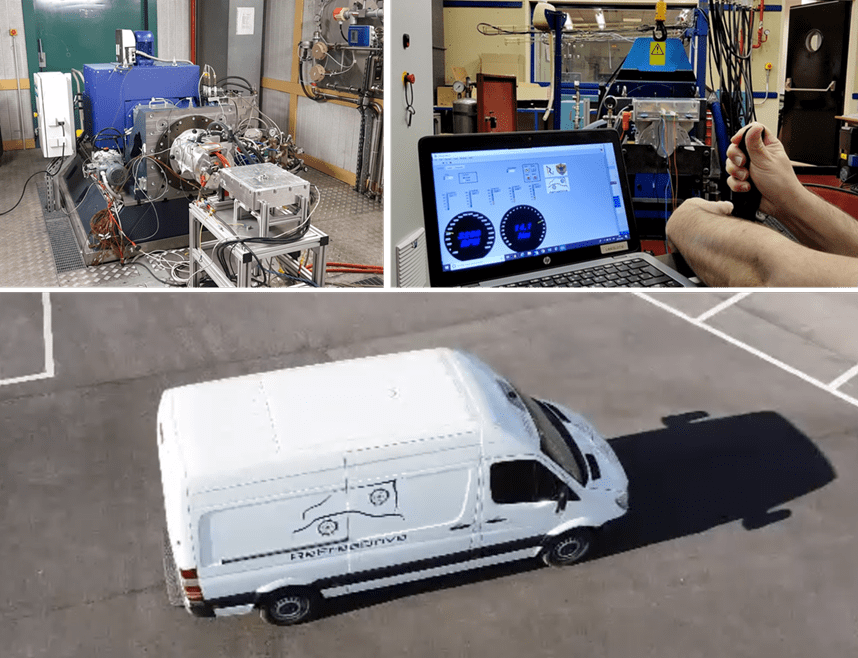
The eight motors manufactured in the project have been tested stand-alone in a motor test bench to confirm the performance. Two of the solutions have been integrated with the power electronics and the cooling system and have been tested in a specific test bench. And finally, the pure reluctance motor, the power electronics and the rest of auxiliary systems have been integrated into a vehicle to perform acceleration, consumption, dynamic, and range tests.
This development has been made in the frame of the European Project ReFreeDrive, a three years European Project that has recently reached his end. The research leading to this result has received funding from the European Union Horizon 2020 Programme under Grant Agreement nº 770143.
by cidaut | Jul 15, 2021 | Materials, MOBILITY
High strength steel tubular frames are a cost effective solution for urban electric vehicles. On one hand the high mechanical characteristics of HSS together with advanced design methodologies makes possible to create an almost non-deformable cabin to guarantee passengers’ and battery’s safety, on the other hand, their predictable behavior and high elongation allow to improve the energy absorption of the collapsible zones.
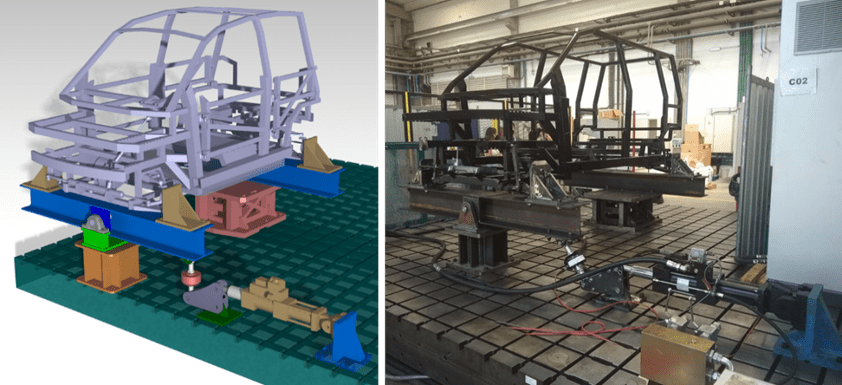
But one of the challenges of the high strength structures when they are highly demanded is the welding process. In this case the welding process has been optimized to nearly obtain the same mechanical properties of the base material, mainly DP800 and DP1000. But the development has gone one step forward, because Cidaut has developed a methodology to determine the effect of the welding process in the fatigue life of the joints in the vehicle structure.
The methodology is based in the use of finite elements simulations and takes into account not only the longitudinal geometry of the beams, but also the section of the beam and the influence of the welding process. The methodology has been validated through the testing of specimens at laboratory scale, and nowadays is been validated in a full vehicle structure test.
The fatigue loads have been determined thanks to the use of a multiboby analysis, where the everyday manoeuvers have been modelled (curves, braking, small potholes, braking in turn, acceleration,…) and the forces in the four corners of the vehicle have been determined to be used in both the finite element simulation and the validation test.
This development has been made in the frame of the European Project Avangard, a three years European Project that has recently reached his midterm. The research leading to this result has received funding from the European Union Horizon 2020 Programme under Grant Agreement nº 869986.
by cidaut | Jul 15, 2021 | MOBILITY

CIDAUT, has officially joined BEPA, the Batteries European Partnership Association (BEPA), confirming its commitment to improve the competitiveness of the European battery industry
Counting more than 160 members, BEPA is a leading association dedicated to create a competitive, sustainable and circular European industrial battery value chain for stationary applications and e-mobility.
The BEPA members will work together to prepare Europe to manufacture and commercialise by 2030 the next-generation battery technologies that will enable the rollout of the zero-emission mobility and renewable energy storage.
BEPA represents the private side association of the BATT4EU Partnerships the co-programmed partnership on batteries launched by the European Commission under Horizon Europe. The partnership will mobilise more 925 million euros, to boost European research and innovation in the battery sector.
CIDAUT will contribute to BEPA goals, by bringing in its expertise in the research and development of passive safety in the automotive industry and strong simulation capabilities to develop predictable models for crash optimization of batteries for electromobility.
For more information visit BEPA website !
by cidaut | Apr 13, 2021 | MOBILITY

March 2021 saw the end of ReFreeDrive project. In the last months of the project all the efforts have been devoted to finishing the manufacturing of the induction and synchronous reluctance motors for both power ranges (75kW and 200kW) and testing them. The goal was to evaluate their performance and validate their suitability to be successfully introduced in the market after the project. The testing stage had three different steps with an increasing level of systems integration, starting from the motor and the power electronics alone, followed by subsequent systems integration or replication (pedal, gearbox, etc.) and ending with the full integration in a commercial van. Cidaut Foundation has been in charge of the powertrain integration activities, in which we employed real world-based driving scenarios to assess and refine the response of the motor prior to its installation in a van.
Finally, as last event of the project, all three EU-funded GV04 projects (ReFreeDrive, modulED and Drivemode) will celebrate a public online workshop on the 16th April, 10:00-12:30 CET. The workshop, titled “Next generation electric drivetrains for fully electric vehicles” will serve as a platform to share with all relevant stakeholders as well as the general public interested in the project how each project has addressed the challenges they aimed to solve, which solutions they have proposed to overcome them and, last but not least, which results they have obtained compared with the KPIs set at the proposal stage. If you would like to attend the project, you can sign up for FREE on the following link: https://copperalliance.zoom.us/webinar/register/7716150099629/WN_aMcHAdDLQ2-Ao3q0cyMUfw
by cidaut | Apr 13, 2021 | MOBILITY, Sin categoría
Urban mobility is smoothly changing, the electric vehicles are slowly but firmly conquering their natural environment. The cities are the places were the highest percentage of the population is concentrated, for this reason it is very important to improve the quality of the air, highly related to the health. At the same time the cities are the places where the travelling distances are shorter, lower to 30km as an average daily. And finally, the cities are the places with a higher number of transport means coexist.
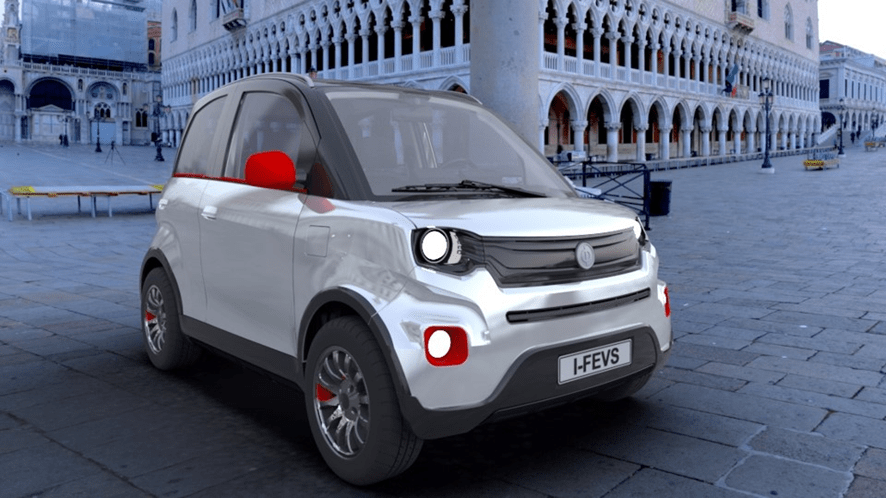
The scenario that has been described involves a high interaction between different transport modes from walking to public transport going through monocycles, scooter, bicycles, motorbikes and four wheelers. The aim of Multi-Moby project, funded by the European Commission in the H2020 Programme, is focused on the four wheelers, taking as a base a high performance low consumption urban electric vehicle, Cidaut is leading the activities to ensure the safety of all the actors involved in the urban mobility. To get this ambitious target the safety is tackled from an integral point of view, including active and passive aspects.
From the active point of view the vehicle is equipped with advanced driving assistance systems that allow the identification of the more vulnerable users of the road and to take autonomous decisions in order to about accidents.
From the passive point of view, an optimized structure and ad-hoc developed restrain system protect the occupants in the event of a lateral, frontal or rear crash. But also, in the case that the active safety systems cannot avoid the accident against a vulnerable road user, the structure of the vehicle has been designed to minimize the damage.
Page 5 of 6« First«...23456»






